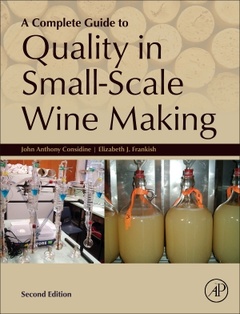A Complete Guide to Quality in Small-Scale Wine Making (2nd Ed.)
Auteurs : Considine John Anthony, Frankish Elizabeth

A Complete Guide to Quality in Small-Scale Wine Making, Second Edition is the first and only book to focus specifically on the challenges relevant to non-industrial scale production of optimal wine with a scientifically rigorous approach. Fully revised and updated with new insights on the importance of all aspects of the production of consistent, quality wine, this book includes sections on organic wine production, coverage of the selection and culturing of yeast, and the production of sparkling, ?methode champenois? and fortified wines. The new edition includes insights into the latest developments in flavor chemistry, production protocols, NIR and FTIR for multipurpose analysis and microplate and PCR procedures, and IR methods for essential analysis among others.
Written by an expert team with real-world experience and with a multi-cultural approach, this text will provide a complete guide to all the stages of the winemaking process and evaluation, and clearly explains the chemistry that underpins it all.
2. The Human Interactions
3. Wine Composition and Chemistry
4. Quality Assurance, Systems and Safety, and their Cultural Drivers
5. Wine Production Processes
6. Wine Microbiology and Methods
7. Fruit Composition, Quality and Harvest Protocols
8. Winemaking Protocols
9. Analytical Principals
10. Experiments for the Winemaker
11. Key Analyses
12. Analyses for Quality Assurance, Teaching and Research
Elizabeth Frankish is a food safety consultant with extensive experience in diagnostic microbiology and risk management for the food industry, including the horticulture, seafood, dairy, and meat sectors. With qualifications in agricultural science and experience in business and project management, she has delivered practical solutions to companies large and small to meet the challenges of microbial contamination, product development, monitoring programs, and training needs from a holistic perspective. She has helped develop numerous food safety guidelines for horticulture and continues to pursue her passion for prevention of food safety incidents through better understanding of the interactions between food systems and their microbial flora.
- Fully revised and updated, each chapter includes new insights and latest information
- Presents fully referenced, tested and proven methods
- Elaborates on the chemistry to enable understanding of the processes and the impact of variation
Date de parution : 08-2023
Ouvrage de 240 p.
21.5x27.6 cm
Thème d’A Complete Guide to Quality in Small-Scale Wine Making :
Mots-clés :
?Acetic acid bacteria; Acids; Alcohol; Amino acids; Ammonium; Analysis; Anthocyanins; Aroma; Aromatic volatiles; Baumé; Brix; Buffering capacity; Calculations; Checklist; Chemical safety; Clarity; Color; Composition; Confined space safety; Correlation; Critical control points; Designed experiments; Dilution series; Faults; Fermentation; Fining protocols; Genetics; Good cultural practices (GCP); Grape quality; Harvest; Health; History; Identification; Instrumentation; Juice; Malic acid; Malolactic bacteria; Maturity; Microbiological techniques; Monitoring; Occupational health and safety; Organic acids; Oxidation–reduction; PH; Phenolics; Physiology; Plate culture; Potassium; Process; Production; Proteins; Quality; Quality assurance; Reducing sugars; Regression; Saccharomyces; Safe operation of machinery; Safety; Sample statistics; Sampling; Sensory; Sensory adjustments; Sensory assessment; Spoilage; Statistics of dispersion; Sulfur dioxide; T-test; Table wine; Tannins; Taste; Techniques; Terminology; Timeline; Titration; Training; Volatile acids; Volumetric; Weights and measures; Wine; Wine stability; Winemaking protocols; Winery; Yeast



